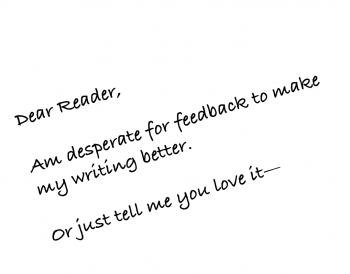Published: March 26, 2018
 During your writing process, you’ll probably get to a point where you’ll ask a friend or relative to read your work, hoping for helpful feedback. I’ve been there, and it’s rough. When I was new to writing, I would ask a friend to read some of my work. Then I’d hold my breath for a week or so, and be disappointed when I go a generic response such as, “I like this” or a marked up document with grammar corrections.
During your writing process, you’ll probably get to a point where you’ll ask a friend or relative to read your work, hoping for helpful feedback. I’ve been there, and it’s rough. When I was new to writing, I would ask a friend to read some of my work. Then I’d hold my breath for a week or so, and be disappointed when I go a generic response such as, “I like this” or a marked up document with grammar corrections.
I wish I had known then that it was OK to ask for specific feedback – I would have made my life and my reader’s much easier.
When seeking feedback, you’ll get better results if you can be specific in what you are asking for. “I like it” “I couldn’t put it down” or “This would make a great movie!” are lovely comments, but not helpful.
But you if you have a willing reader, giving them some direction will not only help you, but allow them to be more comfortable in their role as a critic. I suggest you consider things you are unsure of or points that are nagging you, and without sharing that with your reader, ask to focus on some or all of those with specific questions.
Here’s a list to get you started:
- Where did they bog down? Where did they get confused or bored? As a corollary, you might ask them to flag places that they were absorbed, and what they liked.
- What is their overall impression of the characters? Are they good, bad, boring? Ask how the reader sees the characters; does it match what you see?
- Does the character motivation seem true? Is it introduced seamlessly in the story?
- Is the dialogue smooth and consistent with the era, the genre, the character? If you’re using an accent or a dialect, does it work?
- Does the point of view match the style of the story? Might it be better in first person, or in third?
- Did the story seem plausible?
- Did the premise hold up?
- Can they tell you what the overall theme was, describe the characters motivation? Asking someone to write this up in book report form could be illuminating to an author?
- What is missing? Are there gaps in the story? Unexplained time lapses? Is anything confusing?
- Any Huh? What? or You’re kidding! moments that stretch beyond credibility? Or that are great twists that work?
You don’t have to take all the advice and suggestions you receive, but asking for specific feedback and evaluating it as objectively as you can will help improve your story, and move it one step closer to the finish line or, at least to the next phase: editing.